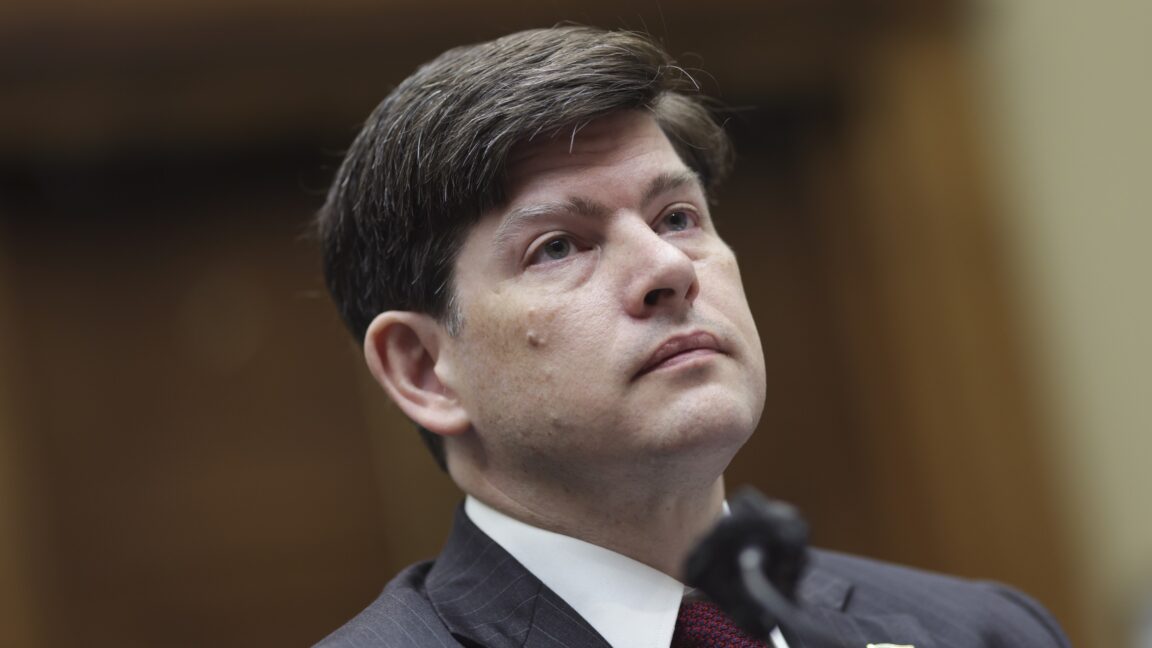Doge days at the FCC
FCC commissioner writes op-ed titled, “It’s time for Trump to DOGE the FCC“
"The FCC is a prime candidate for DOGE-style reform," Nathan Simington writes.
Jon Brodkin
–
May 12, 2025 4:28 pm
|
50
FCC Commissioner Nathan Simington testifies during a House committee hearing on March 31, 2022 in Washington, DC.
Credit:
Getty Images | Kevin Dietsch
FCC Commissioner Nathan Simington testifies during a House committee hearing on March 31, 2022 in Washington, DC.
Credit:
Getty Images | Kevin Dietsch
Text
settings
Story text
Size
Small
Standard
Large
Width
*
Standard
Wide
Links
Standard
Orange
* Subscribers only
Learn more
Minimize to nav
A Republican member of the Federal Communications Commission is proposing a DOGE-style overhaul of the agency's operations, including large cuts to the Universal Service Fund that subsidizes broadband deployment and access.
FCC Commissioner Nathan Simington said the fund should reduce spending on fiber networks and give money to Starlink—helping Elon Musk, the man in charge of President Trump's DOGE initiative. Simington also argued that the FCC is using too many staff hours on reviewing license applications and should instead use automated systems to approve most license requests.
In a Daily Caller op-ed titled, "It's Time For Trump To DOGE The FCC," Simington and his chief of staff, Gavin Wax, wrote that "President Trump's vision for restoring constitutional government is finally taking shape, and nowhere is that more urgently needed than at the Federal Communications Commission."
DOGE already has people at the agency, as three individuals identified as DOGE staffers are listed in an FCC directory and have FCC.gov email addresses. The FCC historically has operated independently from the White House, but Trump issued an executive order declaring that it is no longer an independent agency.
"The FCC is a prime candidate for DOGE-style reform," Simington and Wax wrote. "From redundant enforcement structures to legacy programs that drain resources with little oversight, the Commission is entangled by outdated practices that burden consumers, broadcasters, and taxpayers alike."
Simington's op-ed said the government should "slash the Universal Service Fund and related mandates," such as fees imposed on telephone bills. Universal Service Fund programs are paid for through fees imposed on phone companies, which generally pass the cost on to consumers.
"Few Americans realize that federally mandated fees, which are set at the sole discretion of the FCC, not Congress... raise the cost of monthly phone bills for voice service by over 36 percent," the Simington op-ed said.
Op-ed: Cut Universal Service, give money to Starlink
The FCC's $8 billion-a-year Universal Service system subsidizes the expansion of telecom networks with grants to Internet service providers and makes access more affordable with discounts for consumers.
"These fees fund a patchwork of programs under the Universal Service Fund (USF), including the Internet Protocol Captioned Telephone Service (IP CTS) and other telecommunications relay services," Simington and Wax wrote. "While originally well-intentioned, many of these programs have become outdated, inefficient, and ripe for reform."
Simington's proposed cost-cutting would also target Lifeline, a Universal Service program for people with low incomes; and E-Rate, a Universal Service program for schools and libraries. Simington wants to redirect money to Elon Musk's Starlink system and away from wired broadband networks, even though fiber networks offer superior service and are more future-proof.
"Programs like E-rate and Lifeline, while once valuable, have lost relevance in the age of widespread mobile Internet and emerging satellite services. Wired internet subsidies are increasingly unnecessary and cost-inefficient," Simington wrote. "The rise of satellite broadband, such as Starlink, and fixed wireless alternatives offer a more scalable, less expensive solution. Rather than spending billions to trench fiber cable to remote areas, the FCC should adopt a technology-neutral approach that lets innovation drive infrastructure deployment. Reforming USF to reflect these realities is long overdue and would align with DOGE's mission of smarter, leaner government."
In addition to cutting Universal Service, Simington proposed a broad streamlining of the FCC licensing process. Manual processing of license applications "consumes vast staff hours and introduces unnecessary delay into markets that thrive on speed and innovation," he wrote.
"For non-contentious licenses, automated workflows should be the default," Simington argued. "By implementing intelligent review systems and processing software, the FCC could drastically reduce the time and labor involved in issuing standard licenses."
Moving staff, deleting rules
Simington also proposed taking employees out of the FCC Media Bureau and moving them "to other offices within the FCC—such as the Space Bureau—that are grappling with staffing shortages in high-growth, high-need sectors." Much of the Media Bureau's "work is concentrated on regulating traditional broadcast media—specifically, over-the-air television and radio—a sector that continues to contract in relevance," he wrote.
Simington acknowledged that cutting the Media Bureau would seem to conflict with his own proposal to regulate fees paid by local stations to broadcast networks. It might also conflict with FCC Chairman Brendan Carr's attempts to regulate news content that he perceives as biased against Republicans. But Simington argued that the Media Bureau is "significantly overstaffed relative to its current responsibilities."
Simington became an FCC commissioner at the end of Trump's first term in 2020. Trump picked Simington as a replacement for Republican Michael O'Rielly, who earned Trump's ire by opposing a crackdown on social media websites.
The FCC is currently operating with two Republicans and two Democrats, preventing any major votes that require a Republican majority. But Democratic Commissioner Geoffrey Starks said he is leaving sometime this spring, and Republican nominee Olivia Trusty is on track to be confirmed by the Senate.
The agency is likely to cut numerous regulations once there's a Republican majority. Carr started a "Delete, Delete, Delete" proceeding that aims to eliminate as many rules as possible. Congress is also pushing FCC cost cuts, as the Senate voted to kill a Biden-era attempt to use E-Rate to subsidize Wi-Fi hotspots for schoolchildren who lack reliable Internet access to complete their homework.
Jon Brodkin
Senior IT Reporter
Jon Brodkin
Senior IT Reporter
Jon is a Senior IT Reporter for Ars Technica. He covers the telecom industry, Federal Communications Commission rulemakings, broadband consumer affairs, court cases, and government regulation of the tech industry.
50 Comments









